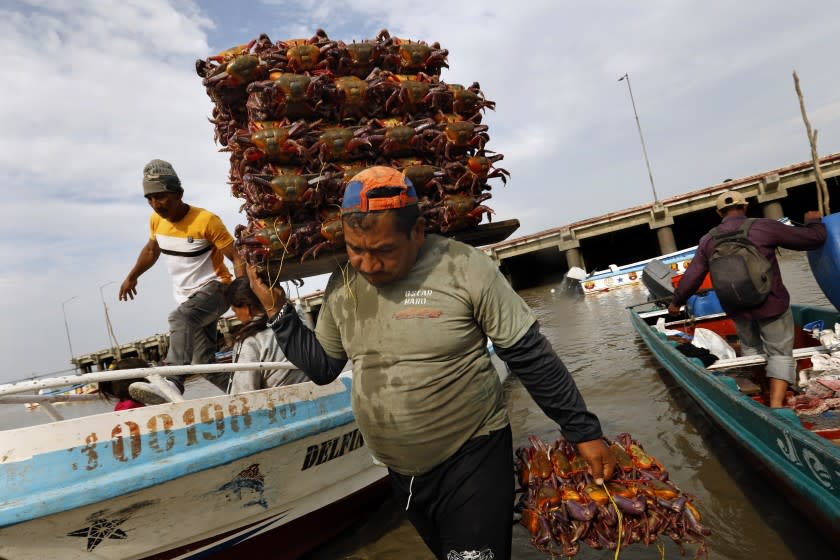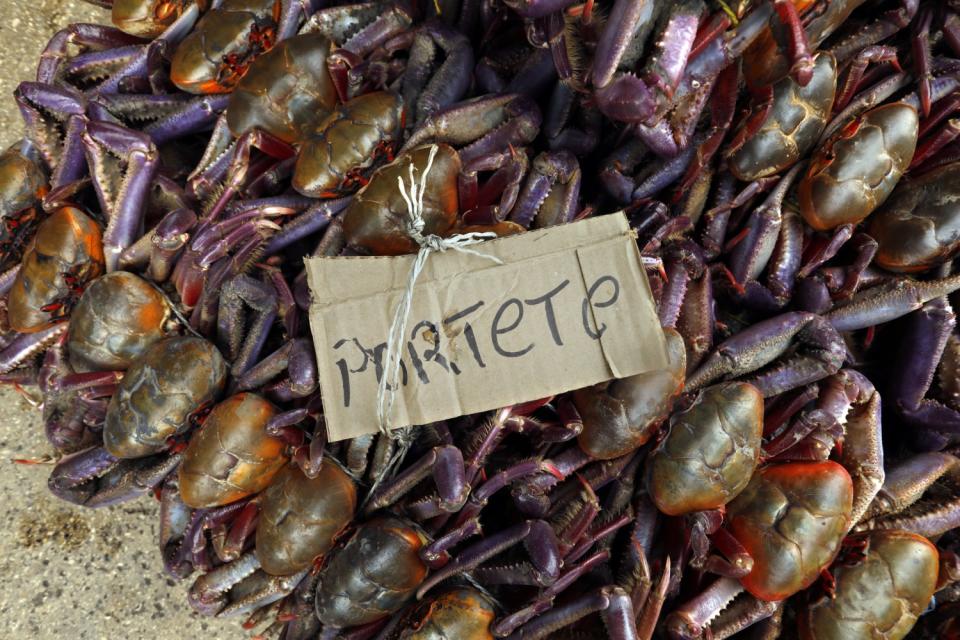Tensions rise in Ecuador and Peru as Chinese fishing fleet moves south from Galapagos

Tensions are rising along the Pacific coast of South America as a giant Chinese fishing fleet of roughly 300 vessels moves from the edge of the Galapagos marine preserve to the waters off Peru.
Tuesday afternoon, President Trump excoriated China on a variety of issues, ranging from the coronavirus to human rights, in a speech to the United Nations. He singled out Chinese fishing and maritime behavior, saying the country “dumps millions and millions of tons of plastic and trash into the oceans, overfishes other countries’ waters” and destroys coral reefs.
Soon after, the U.S. Embassy in Peru issued a tweet noting the Chinese mega-fleet off its shores, accusing the fleet of changing ship names and disabling GPS tracking to limit surveillance of the fleet’s activities.
“Overfishing can cause enormous ecological and economic damage,” the tweet said. “Peru cannot afford such a loss.”
That prompted a swift response by the Chinese Embassy in Peru, which suggested the U.S. was lying about the fleet’s environmental and maritime integrity.
“We hope that the Peruvian public is not deceived by false information,” noted the statement, which was written in Spanish.
Peru and Ecuador both have large fishing fleets and are highly dependent on seafood, for sustenance and valuable export dollars. In 2018, the two countries captured 4.5 million metric tons of fish, nearly as much as the United States, but only about a quarter of what China harvested from the sea, according to the World Bank.
Both countries benefit from the Humboldt Current, a cold, nutrient-rich current of water off of South America's Pacific coast that helps feed one of the world's most productive fishing grounds. This year, China's fishing fleets have threatened the security of the food source, the most recent conflict involving China's push to harvest seafood from oceans worldwide.

Beginning in July, the Ecuadorean government and international environmental groups began tracking the mega-fleet, which was parked at the very edge of the Galapagos Marine Reserve, a UNESCO World Heritage site and an Ecuadorean national park.
The reserve covers more than 51,000 square miles of protected ocean around the archipelago, which is located roughly 600 miles off the Ecuadorean coast. More than 20% of the species found within the reserve are unique to the archipelago.
According to a report issued by Oceana, which tracked the fleet, the Chinese fishing armada logged roughly 73,000 hours of fishing between July 13 and Aug. 13 and accounted for 99% of the fishing activity on the reserve’s perimeter.
On Aug. 2, U.S. Secretary of State Michael R. Pompeo issued a statement saying that the U.S. supported Ecuador’s efforts to prevent China from engaging "in illegal, unreported, and unregulated fishing." He add that the U.S. supports nations "whose economies and natural resources are threatened by PRC-flagged vessels’ disregard for the rule of law and responsible fishing practices." PRC is an acronym for the People's Republic of China.
Later that month, the United States Coast Guard dispatched one of its vessels, the cutter Bertholf, to the area, in coordination with the Ecuadorean navy.
The force patrolled more than 3,000 miles in international and Ecuadorean waters to monitor the mega-fleet.
Last week, the Coast Guard announced a new initiative designed to mitigate and prevent illegal, unreported and unregulated fishing in international waters.
According to government and advocacy sources, the mega-fleet has moved south in recent days toward the waters off Peru.
Like the United States and other countries, Ecuador has an exclusive economic zone of 200 nautical miles off its shore, over which it has sovereign rights for all resources. According to news reports, the government is discussing if it could expand that zone to 350 nautical miles.
In addition, the South American country is reportedly working with neighbors such as Costa Rica, Panama and Colombia to establish a corridor of marine reserves that would seal off much of the rich, biodiverse marine life along the Pacific coast from commercial fishing.
Ecuador is also in debt to China. In August, the nation was in negotiations with the International Monetary Fund and others to restructure $17.4 billion in debt. Those negotiations included $2 billion in bilateral loans from China, according to Bloomberg. A deal was struck earlier this month, although it's unclear how much the nation received from China.
In 2018, Ecuador was more than $6.5 billion in debt to China.

China's worldwide fishing fleet is enormous, with estimates suggesting 17,000 vessels cruising waters far from China's shores. By contrast, the U.S. reports roughly 300 fishing vessels in international waters.
With the waters near China mostly depleted, and the Chinese population accounting for roughly one-third of the world's fish consumption, the nation has had to forage elsewhere — including the waters off West Africa and Latin America, where, according to experts, local governments lack the funding and fleets to police the waters.
At a hearing last week, U.S. Sen. Jim Risch (R-Idaho), chairman of the Senate Foreign Relations Committee, applauded President Trump for working with allies to counter China's aggressive moves on multiple fronts.
"Aggressive and illegal Chinese fishing practices violate the territorial integrity of coastal Latin American countries, raising significant long-term security concerns," Risch said.
This story originally appeared in Los Angeles Times.

